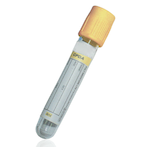Lithium
Specimen Volume
1 ml whole blood minimumSample Preparation
Centrifuge specimens
Turnaround Time
1 daySample Processing In Laboratory
Usual
Sample Stability
Specimens stable at 4ºC for 1 week. Allow specimens to reach room temperature before analysis.
General Information
Lithium is a monovalent alkali metal, which is usually absent in the human body. It is used in the treatment of manic depression psychosis. The drug has proven highly effective in its intended use but some clinically significant complications have been associated with its use. Lithium binding to the plasma proteins is less than 10% and its half-life is 7 – 35 hours. It is mainly eliminated from the body by urine (95%)
Lithium has a very narrow therapeutic range. Initial dosing is aimed at between 0.80 to 1.20 mmol/L and the long-term maintenance level is 0.60 to 0.80 mmol/L. The concentration of Lithium in serum during drug therapy is closely monitored, because Lithium is acutely toxic with concentrations that are slightly higher than the above therapeutic range. The therapeutic window may vary depending on whether the patient is being treated for acute mania or receiving prophylactic therapy. Lithium can have a detrimental effect on fluid balance via action in the kidney
Patient Preparation
Collect specimen 12 hours after the last dose
Notes
Contact the lab if urgent.
Minimum time for patient to reach steady state without loading or after dosage change is 3 days.
DO NOT use lithium heparin tubes
Reference Range
Therapeutic range (for prophylactic treatment 12h post dose): 1.0 - 1.2 mmol/L
Source of Reference Range
Abbott DiagnosticsSpecifications
- EQA Status: NEQAS
- EQAS Scheme: Yes








